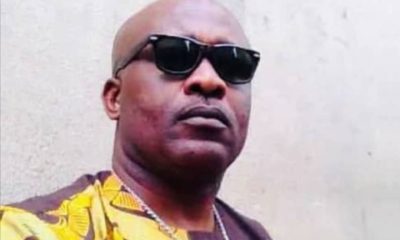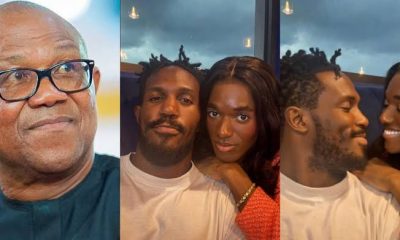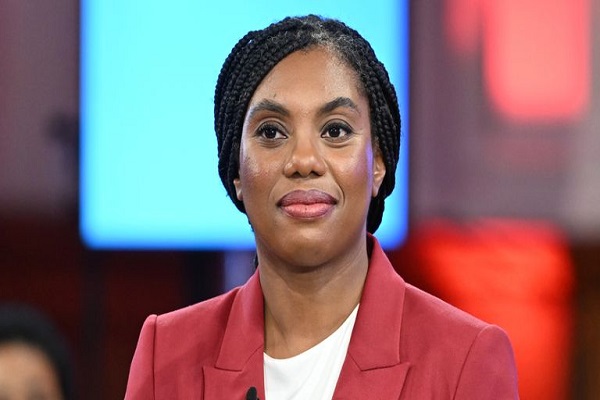Africa
Nigeria’s evolving federalism & the search for sustainable local government administration ~ by Governor Charles Soludo

The Anambra State House of Assembly passed two progressive legislations pursuant to its powers under the Constitution (Anambra State Economic Planning and Development Law, 2024; and Anambra State Local Government Administration Law, 2024), and I have signed them into law.
This has generated commentaries and debates especially in relation to their consistency or inconsistency with the recent Supreme Court judgement and the mantra of “local government autonomy.” My media team, other members of my government as well as well meaning Nigerians have vigorously defended these progressive laws and that should suffice.
At this moment in Nigeria, being a state governor is not a fanciful job, especially given the gamut of allegations and innuendoes levelled against governors, vis-a-vis local government funds.
In the circumstance, any comment by me would be construed as self defence. However, I have a citizen duty to clarify and contribute to the discourse—especially as one who has been extensively involved in the debate and search for a more perfect union.
At the outset, let me make an important disclosure. I am a federalist and a proponent of competitive federalism for a multi-ethnic, multi-religious, vast country as Nigeria. From my limited knowledge, I do not know any federation (except perhaps some variants in Brazil) where a uniform local government system is provided for in a federal constitution or where the local government is treated as a de-facto federating unit.
I understand that the issue of appropriate local government system was vigorously debated by the framers of the 1999 Constitution and a compromise was to insert Sections 7 Constitution which, among others, empowers each State through its House of Assembly to make laws which provide “for the establishment, structure, composition, finance, and functions…” of the local governments.
Pioneered by Lagos State about 2004 several states have various laws pursuant to these Constitutional powers. The composition or structure of local governments in Lagos or Ebonyi state is certainly different from Anambra.
Also, the debate as to whether local governments should be part of the federal constitution or left to each federating unit (state) to determine its own appropriate local government system is still an unsettled matter. The APC committee on restructuring Nigeria proposed scrapping the local government from the Constitution of Nigeria.
As the former chairman of planning and strategy committee of Ohanaeze Ndigbo Worldwide, I know that the published position of Ndigbo in 2018 was that local governments be scrapped from the Constitution and let each state/region determine the type of local administration that suits it.
Similar positions have been argued by Afenifere, PANDEF, Middle Belt Forum, etc. This is an issue for another day.
In the context of our evolving federalism, I see the recent Supreme Court judgment regarding the direct transfer of funds belonging to the local governments as an important contribution to our search for effective and transparent administration of resources at the local level. I see the judgment as an opportunity for public good.
Given the Constitutional mandate for joint planning between the State and local government, I see the judgment as an opportunity for greater transparency and predictability regarding the sources and uses of funds, as well as greater coordination and collaboration between the State and local government.
If there was any state where the State-Local Government Joint Accounts Committee did not manage the LG funds transparently, the Supreme court judgment is an opportunity and mandate to do it differently by further empowering the LG administration.
But there is more work to be done. We all need to think through how the funds transferred to the LGs should be appropriated, spent, or accounted for. Monies meant for the federal or state governments are not spent by the president or governors.
The National Assembly and State Assemblies make appropriation laws on how and by whom the monies should be spent and provide oversight functions. What happens to the monies directly sent to the LGs? Who spends the monies, on what and how will they be accounted for?
This is where Section 7 of the Constitution comes handy, and the Anambra State House of Assembly has risen to the occasion. Happily, the Supreme Court did not nullify Section 7 of the Constitution. The new laws by Anambra House of Assembly are therefore consequential to give operational life to the Supreme Court judgment and not to undermine it.
If the State House of Assembly abdicates this constitutional duty, the Local Government will then have no law on the use and management of its finance which the Constitution has given the State House of Assembly (and only the House of Assembly) the mandate to legislate on.
Indeed, in many states the House of Assemblies retain the power to suspend or remove chairpersons of local governments.
By the way, isn’t the legislative authority exercised by the State Assemblies under Section 7 of the Constitution similar to the powers granted by the Constitution to the National Assembly over the Federal Capital Territory and its Area Councils?
I understand that the Senate President had recently at one of the Plenary Sessions rhetorically asked if it was indeed possible to grant the kind of “autonomy” some people talk about without major amendments to the Constitution. Many Nigerians ask the same question.
I also understand that the Senate recently resolved to begin the process of Constitutional amendment in this regard. This is a welcome development. But until that is done, our laws pursuant to the Constitution and designed to give operational effect to the Supreme Court judgment remain subsisting and valid.
A critical instrument for muddling through our evolving federation and delivering higher efficiency and effectiveness in development is through structured collaboration among the tiers of government. No tier of government enjoys absolute autonomy.
For example, the FGN has exclusive right over solid minerals, but the States have exclusive right over the land. Only a collaborative framework will maximize benefits from natural resources.
Currently, there is a collaborative funding for the security agencies. The States and LGs contribute tens of billions monthly and deducted directly from FAAC every month towards the funding of the armed forces which are exclusively under the FGN.
At the state levels, each state is spending a fortune of its own revenues on logistics and operational costs for the federal security agencies. The FGN, States and LGs are jointly paying for the FGN initiative on metering, etc. The states understand the above “emergency measures” as part of the collaborative arrangements to make Nigeria work better.
A federal agency, the Debt Management Office (DMO) must clear any state government seeking to borrow from domestic financial system, while the National Assembly must approve States’ external borrowing.
The federal UBEC insists on counterpart funding by states before it can release federal funds for basic education and also supervises the utilization of the contributions by states. There is a dozen or more areas of oversight of federal agencies over State finances.
The above illustrations are simply to make the point that no tier of government can function in absolute autarky without collaboration with others. Given the functions assigned to the LGs by the Constitution, it is impossible to see how they can perform them without active collaboration with State governments.
Because the Constitution did not envisage “absolute autonomy” for the Local Governments, it gave the State House of Assembly powers to make laws for them and equally did not create a Local Government Judiciary distinct from the State Judiciary.
The two legislations passed by the progressive Anambra House of Assembly seek to achieve three objectives: consistency with the Constitution and judgment of the Supreme Court; enhanced transparency and productive collaboration; and promotion of sustainable finance, democracy, and development at the local government.
The laws seek to codify the collaborative arrangements to promote transparency and accountability. We seek to avoid ad-hoc or arbitrary arrangements—- building to last! The good news is that the eminent jurists at the Supreme Court did not outlaw collaboration and cooperation among the LGs in funding joint or common services, nor did they nullify Section 7 of the Constitution.
What the new laws simply require is that ALL the chairmen/mayors of the local governments, meeting under the aegis of the State Economic Planning Board (similar to the National Economic Council) decide what percentage of their revenues to contribute to a Joint Local Government Account to pay for common/pooled services such as:
(a) payment of salaries, allowances, gratuities and pensions of workers and retirees under the Local Government Service Commission;
(b) provision and maintenance of primary, adult and vocational education including all salaries, allowances, gratuities and pensions payable in that regard;
(c) provision and maintenance of primary health services including all salaries, allowances, gratuities and pensions payable in that regard;
(d) payment of allowances to traditional rulers and Presidents-General of the communities;
(e) Subventions to the Local Government Service Commission; and even for community security.
What many people do not know is that the Constitution puts primary education and primary health care under the local governments. Many also do not know that primary school teachers are pooled under the UBEC—Universal Basic Education Commission.
Workers in all the LGs are also pooled staff under the Local government service commission. Ditto for primary health workers. Absolute autonomy would mean that each LG would have its own primary education policy, employ its own teachers, and pay them whatever it can afford and whenever it can do so, etc.
Now that Anambra has free education for primary and secondary education in all public schools, some LGs may decide that they cannot afford it. It might even get to a point where some LGs might ask “non-indigenes” who are workers in the LGs or teachers in primary schools to “go home” to their LGs of origin due to budgetary or other constraints.
Indeed, absolute autonomy of LGs would mean that institutions that pool resources and workers would be scrapped including the Local Government Service Commission, Local Government Pension Board, the Anambra State Universal Basic Education Board (ASUBEB), the Primary Health Care Agency, etc.
Does it mean that the federal UBEC or Federal Ministry of Health would have to deal with each of the 774 LGs in respect of primary education or primary health care instead of coordinated through the State UBEC or state primary health care agency?
This would be a recipe for humongous chaos, not only for the administration of local government and pensions, but more so in the primary education and primary health sectors. My administration inherited 4 years arrears of gratuity which we have been clearing systematically.
How do you share the outstanding balance among the LGs or pay pensions to over 15,000 LG retirees who served the LGs as a pool without pooling of funds? Some years ago, some LGs rejected teachers posted to their LGs because it would jerk up their wage bill.
Yes, our nascent federation is evolving but some of us as practitioners are determined to make it work for the people while we have the opportunity. I believe in building enduring institutions, especially ones founded upon due process, transparency, and rule of law.
People remind me that many of the institutional reforms we established at the CBN still endure. Since assumption of office as Governor 30 months ago, we have devoted a lot of efforts in reforming and strengthening institutions, including the local government administration.
Today, Anambra State under my watch is ranked number 1 among the 36 states on fiscal transparency by BudgIT, and among the top five states on financial sustainability. We inherited a local government system with four-year arrears (2018-2022) of gratuity to retired primary school teachers and other staff of local government.
We have restructured their finances back to sustainability. Everyone who retired from the local government and State civil service since my tenure is paid gratuity/pension, and we are on course to clear the outstanding arrears soon.
Three years’ arrears on counterpart funding for Universal Basic Education Commission (UBEC) has been cleared, resulting in billions of Naira recently invested in our primary schools. Some 326 primary health centres are being constructed or modernized in all the 326 wards in the state as well as employing hundreds of medical personnel to man the primary health centres.
Most of the local government secretariats have been remodelled and equipped, and the LG system is once again alive. This is not to mention that 3,615 out of the 8,115 new teachers recruited under my administration are for primary schools and they are being paid. We do not want to go back!
So, the laws are designed to protect our gains so far and strengthen the system for the future consistent with the Constitution and laws. I always remind myself that I am a bird of passage, and eventually, I will leave office. But we must build to last— for the next generations.
More specifically, the new laws are designed to protect our workers at the local level and protect our primary education and primary health care from chaos and collapse. Many teachers and pensioners wrote me to passionately plead that they do not want the agony of the 1990s–2003 when some primary school teachers in some LGs were paid and others owed salaries.
I just read a report that the organized labour (particularly the Nigerian Union of Local Government Employees, NULGE; Nigerian Union of Teachers, NUT; and Nigerian Union of Pensioners) were urging the FGN not to transfer workers/teachers’ salaries to the local government in the name of “local government autonomy”.
No law protects the workers against nonpayment of salaries or pensions by governments. In Anambra we want to ensure that we do not wake up and hear that some LGs paid salaries of primary school teachers and others did not or that some pensioners are paid and others not, or that some contribute towards UBEC counterpart-funding while others do not.
The laws seek to create a framework to ensure that the basic functions mandated by the Constitution for the local governments are discharged as a matter of first-line charge or the irreducible minimum.
With these laws, workers, and retirees from the local government system in Anambra (primary school teachers, primary health workers, workers in the local government system under the local government service commission) can sleep with their two eyes closed.
The LGs and State government can also collaborate in the security of the communities, just as the States and FGN collaborate in funding even the federal security agencies.
It is equally important to understand that the Constitution mandated this collaboration between the States and Local Governments when in its section 7 (3), it provides that:
“It shall be duty of a local government council within the State to participate in economic planning and development of the area referred to in sub section 2 of this section and to this end, an economic planning board shall be established by a Law enacted by the House of Assembly of the State”.
This provision gave rise to the establishment of the Anambra State Economic Planning Board of which all the local government chairpersons are members and who, among other things, decide on the percentage to be contributed to the Local Government Joint Account.
It is important to appreciate that this money is not handed over to the State but remains with the Local Governments under a joint pool for the discharge of certain services by the local governments which services are uniform/common among the local governments as stated earlier.
In sum, the laws ensure that the State can function in a cohesively planned, transparent and sustainable manner to maximize the security and welfare of the citizens. They constitute a very smart solution to a possible systemic threat.
Governors are often accused of seeking to “control” LG funds with insinuations that LG funds are mismanaged. Of course, in a society where public office is seen as “dinning table” and public trust is low, people judge others by their own standards: by what they would do if they were in the position.
I often ask: control for what? While I cannot hold brief for every governor, I know that most states are struggling to ensure a solvent local government system. I wish I can be spared the headache, if not for the predictable collateral damage to the system if we abdicate from structured oversight and collective accountability.
The challenge ahead can be daunting given the quantum rise in wage bills because of the new minimum wage, as well as consequential rise in future pension/gratuity payments.
Without active collaboration and coordination between state and local governments, many LGs will end up in a huge financial mess, requiring bailouts by state governments or will FGN directly intervene in every case of insolvency among the 774 LGs?
In conclusion, the progressive legislations by the State Assembly are designed to unleash the creative powers of the LGs, encourage peer learning, optimal development outcomes in planning and execution among the LGs, as well as novel accountability and transparency.
The laws are ingenious by creating multiple layers of collaborative oversight whereby the LGs agree on monies to set aside and managed collectively by them for common services or first-line charges, while the rest is appropriated by the Congress of Councillors in each LG.
In an innovative sense, the legislative powers – including powers of appropriation and oversight now largely reside with the local government legislature—Congress of Councillors, which is empowered to make bye-laws, which are in the nature of regulations, for the Local Governments (as it is the House of Assembly that is empowered by the Constitution to enact laws to guide the Local Governments).
Since neither the Constitution nor the Supreme Court judgment prescribes the manner of appropriation, expenditure, and audit/accountability for local government funds, the House of Assembly and the Congress of Councillors fill in the blanks under the new laws pursuant to Section 7 of the Constitution.
The evolution of our federalism is a work-in-progress, and the new Anambra laws constitute creative and progressive additions to institution-building. May the Federal Republic of Nigeria continue to win!
Chukwuma Charles Soludo, CFR, is the Executive Governor of Anambra State.
Africa
JUST IN: Burkina Faso Bans Bill Gates-Backed GMO Malaria Project

Burkina Faso’s military government has halted a malaria eradication project backed by billionaire philanthropist Bill Gates and his foundation.
The project, run by the research consortium Target Malaria, focused on releasing genetically modified mosquitoes into the environment to help eradicate malaria.
On Friday, authorities ordered Target Malaria to immediately suspend all operations in the West African nation.
The move marks yet another clash between the government and international non-governmental organizations, many of which have faced intense restrictions under military rule.
The decision sparked heated reactions from civil society groups. Opponents of the project argue that Burkina Faso should focus on safer and more traditional solutions rather than experimenting with controversial genetic technologies.
A spokesperson for a coalition campaigning against the project stated that citizens “deserve protection through proven health measures, not risky experiments.”
Target Malaria, however, defended its work.
The group insisted that since 2012, it has complied with Burkina Faso’s national laws and worked closely with local authorities.
It expressed readiness to cooperate further with the government despite the sudden suspension.
The project has faced criticism not only within Burkina Faso but also internationally.
It became the target of online disinformation campaigns that claimed the genetically modified mosquitoes posed unforeseen dangers to the ecosystem.
While the first release of such mosquitoes took place in 2019, the long-term effects remain under global scientific debate.
Burkina Faso, one of the ten countries most affected by malaria, recorded more than eight million cases in 2024 alone.
The disease remains one of the leading causes of death in the country, particularly among children under five.
Supporters of the Target Malaria initiative argue that innovation is crucial to ending this deadly cycle, but critics fear it could introduce new risks.
This ban comes amid wider tensions between the military rulers and international organizations.
Since seizing power nearly three years ago, Captain Ibrahim Traoré’s administration has increasingly tightened control over foreign-funded NGOs.
In recent months, the government revoked the licenses of at least 21 groups, accusing some of pushing foreign agendas and destabilizing national sovereignty.
Analysts see the latest crackdown as part of a broader trend. Burkina Faso’s rulers are distancing the country from Western-backed projects while strengthening ties with alternative global partners.
However, the sudden halt to malaria research may come at a cost, as the country continues to battle one of the world’s deadliest diseases.
For now, the future of genetically modified mosquito projects in Burkina Faso remains uncertain.
The debate highlights the sharp divide between innovation and caution, science and politics, as the country balances urgent health needs with national sovereignty concerns
Africa
Why Every Nigerian Should Learn Combat Skills — CDS

The Chief of Defence Staff (CDS), General Christopher Musa, has urged all Nigerians to acquire combat skills such as Karate, Taekwondo, and Judo to protect themselves in the face of increasing danger.
Speaking on Channels Television’s Politics Today programme on Thursday, August 21, General Musa likened learning martial arts to other essential survival skills, including driving and swimming.
“That one should be taken as learning driving, learning how to swim.
Whether we have war or not, it is a survival instinct,” he said.
He added that in Europe, swimming and basic security education are compulsory because citizens must understand and practice personal safety.
The defence chief emphasised that the National Youth Service Corps (NYSC) should incorporate unarmed combat training into its programme to prepare graduates for real-world threats.
He explained, “That’s what the NYSC is supposed to do, but the NYSC has been watered down to three weeks. Self-defence is very important.
Unarmed combat, swimming, driving these are critical aspects of human survival. We should never take them for granted because they prepare us for the future.”
General Musa further encouraged Nigerians to remain situationally aware of their environment, alerting authorities to any suspicious activities or individuals.
He said, “The world we are in now is dangerous. We have individuals who don’t mean people well. They kill for whatever reason.”
Highlighting evolving threats, General Musa disclosed that terrorists increasingly use gold to finance their operations.
He noted that complex international networks make it difficult to immediately expose or prosecute these financiers. “Gold is the main source.
They circulate it through various channels, including foreign links, which complicates intervention,” he explained.
General Musa acknowledged that bad roads and challenging terrains hinder rapid military response to attacks.
He said, “Many Nigerians expect immediate intervention from the Armed Forces without understanding the logistical challenges. By the time information reaches us, terrorists have already struck and vanished because they move more quickly in these regions.”
He added that improvised explosive devices (IEDs) in the North-East further slow troop movement.
Regarding the Southeast, General Musa noted that the arrest of pro-Biafran agitator Simon Ekpa in Finland in November 2024 has improved security in the region.
He said, “Troops are actively pursuing Ekpa’s lieutenants in Imo, Enugu, Anambra, Ebonyi, and Abia states. We will continue operations until all threats are neutralised.”
The CDS also praised the synergy among the Nigerian Army, Air Force, and Navy, which led to the arrest of Ansaru terrorist leaders, describing it as a major success in the fight against terrorism.
General Musa concluded by announcing an African Chiefs of Defence Staff conference to foster continental collaboration and enhance regional security efforts.
Africa
‘Misplaced Priority’: Peter Obi Blasts FG’s ₦142bn Bus Terminal Project

Former Labour Party presidential candidate Peter Obi has slammed the Federal Government’s approval of ₦142 billion for the construction of bus terminals across Nigeria, describing it as a reckless misplacement of priorities.
Obi issued a statement on Friday, August 22, via his Official X formerly Twitter platform, warning that the project reflects poor leadership and lack of focus in managing Nigeria’s limited resources. He titled his statement, “₦142 Billion for Bus Terminals.”
According to him, the true test of leadership is how scarce resources are prioritized.
He stressed that investing such a huge amount in bus terminals while critical sectors like healthcare suffer shows a government that is out of touch with citizens’ realities.
Obi said: “The difference between success and failure in any nation is how leaders prioritise resources.
The decision to spend ₦142 billion on six bus terminals exposes a lack of competence and vision. It is a clear sign of poor leadership.”
The Federal Executive Council had recently approved the funds for the construction of one modern bus terminal in each of the six geopolitical zones.
The government described it as part of efforts to modernise transport infrastructure and improve mobility nationwide.
But Obi strongly disagreed. He compared the allocation to healthcare funding, pointing out that the combined budget for all teaching hospitals and federal psychiatric centres in Nigeria is less than ₦100 billion in the 2024 budget.
“This is disturbing,” Obi continued, “because health remains one of the most critical sectors of development. Yet it is underfunded and deteriorating rapidly.
The World Health Organization has reported that over 20 million Nigerians live with mental health conditions.
This is a tragic irony. How can the government ignore this crisis and focus on bus terminals?”
He argued that the health sector, alongside education and poverty reduction programs, deserves priority attention.
Obi insisted that until government spending reflects the real needs of Nigerians, the country will remain trapped in poor governance.
Many Nigerians have also taken to social media to express anger, echoing Obi’s concerns. Critics argue that the decision proves the Federal Government is disconnected from the economic struggles of ordinary citizens.
For Obi, the ₦142 billion project is not just a case of wrong timing.
He sees it as a clear example of governance failure and misplaced priorities.
Africa
Canada Announces Permanent Residence Lottery Results for Foreign Workers

Canada has carried out a new Express Entry lottery, inviting thousands of skilled workers to apply for permanent residency.
Financial Express report that the Announcement which came on Wednesday, August 20, 2025, marks one of the most significant rounds this year.
Immigration, Refugees and Citizenship Canada (IRCC) invited 4,200 candidates in the latest Express Entry draw.
The invitations were sent under the no-program-specified category, which means candidates from all economic immigration programs were considered.
To qualify, candidates needed a Comprehensive Ranking System (CRS) score of at least 507 points.
This cut-off is higher than several recent rounds, showing rising competition in Canada’s immigration pool.
Breakdown of Recent Express Entry Draws
The August 20 general draw came just a week after Canada held two smaller, targeted draws.
On August 14, 2025, IRCC issued 1,500 invitations in a Healthcare category-based draw, with a minimum CRS of 430.
On August 13, 2025, another STEM occupation draw invited 1,000 candidates, with a CRS cut-off of 481.
This means Canada has invited more than 6,700 candidates in August alone, highlighting its steady demand for skilled workers.
Why Express Entry Remains Key
The Express Entry system is Canada’s main pathway for skilled migration. It manages applications for three major programs:
- Federal Skilled Worker Program (FSWP)
- Federal Skilled Trades Program (FSTP)
- Canadian Experience Class (CEC)
Through this system, candidates are ranked by CRS points based on age, education, work experience, language skills, and adaptability. Higher scores improve the chance of receiving an Invitation to Apply (ITA).
Impact of the Rising CRS
The 507-point cut-off has sparked concern among applicants.
Many worry that higher thresholds make it harder to qualify unless they boost their profiles with stronger English or French test results, higher education, or Canadian job offers.
Immigration experts note that Canada is prioritizing candidates who are more likely to integrate quickly into the economy.
With rising competition, applicants may need to explore provincial nomination programs (PNPs), which can add up to 600 extra CRS points.
Canada’s Immigration Targets
Despite higher CRS cut-offs, Canada’s immigration outlook remains ambitious.
The government has pledged to welcome 485,000 new permanent residents in 2024 and 500,000 in 2025.
Skilled workers make up a large share of this intake.
With labor shortages in sectors like healthcare, technology, and construction, Canada continues to use Express Entry to attract foreign talent.
What Applicants Should Do
Experts recommend that prospective migrants keep their profiles updated and monitor both general and category-based draws.
Targeted draws for healthcare, STEM, and trades occupations often have lower CRS cut-offs, giving candidates more opportunities.
For those struggling to meet the high CRS threshold, exploring study routes in Canada, provincial nominations, or job offers may increase chances.
The August 20 Express Entry draw shows Canada’s ongoing commitment to skilled immigration.
With over 4,200 invitations issued and CRS cut-offs climbing, the competition is intense.
However, the system continues to provide multiple entry points for determined applicants worldwide.
Africa
Japan Designates City as Hometown for Nigerians

The Japanese government has officially designated the city of Kisarazu as the hometown for Nigerians, marking a major step in strengthening cultural diplomacy and workforce collaboration between both nations.
The announcement was made during the ninth Tokyo International Conference for African Development (TICAD9) and confirmed by the Director of Information at Nigeria’s State House, Abiodun Oladunjoye.
According to the agreement, the Japanese government will introduce a special visa category for highly skilled and innovative young Nigerians who are willing to relocate to Kisarazu to live and work.
This initiative also extends to artisans and blue-collar workers from Nigeria who are ready to upskill and contribute to Japan’s economy.
At the same event, the Japan International Cooperation Agency (JICA) designated three other cities as hometowns for African nations:
Nagai in Yamagata Prefecture for Tanzania,
Sanjo in Niigata Prefecture for Ghana, and Imabari in Ehime Prefecture for Mozambique.
These hometown designations aim to foster manpower development, cultural exchanges, and economic partnerships that will benefit both Japan and the participating African countries.
Nigeria-Japan Partnership
Nigeria’s Charge d’Affaires and Acting Ambassador to Japan, Mrs. Florence Akinyemi Adeseke, received the certificate on behalf of Nigeria alongside Yoshikuni Watanabe, the Mayor of Kisarazu.
The ceremony highlighted the city’s longstanding relationship with Nigeria, as Kisarazu was the official host town for the Nigerian contingent during the 2020 Tokyo Olympics, where athletes trained and acclimatised before moving to the Olympic village.
Local Japanese authorities hope that designating Kisarazu as Nigerians’ hometown will boost the city’s population, enhance regional revitalisation, and strengthen bilateral cooperation.
Japan’s Vision for Africa
Japanese Prime Minister Shigeru Ishiba, in his address at TICAD9, announced $5.5 billion in new investments across Africa.
He stressed the importance of mutual understanding, local solutions, and collaborative development, focusing on three key areas:
Private sector-led sustainable growth,
Youth and women empowerment.
Prime Minister Ishiba also acknowledged Japan’s challenges with an ageing population and shrinking agricultural land, calling on African nations to support Japan while benefiting from expanded cultural and economic opportunities.
What This Means for Nigerians
For Nigerians, the recognition of Kisarazu as their official hometown in Japan provides more than symbolic value.
It creates new employment opportunities, encourages skills transfer, and opens a pathway for closer cultural integration between both nations.
This strategic move underscores Japan’s commitment to forging deeper ties with Africa, while offering Nigerians a platform to thrive abroad
-

 Celebrity/Entertainment3 days ago
Celebrity/Entertainment3 days agoHow Nigerian TikToker Geh Geh Made ₦45 Million in One Night
-

 Featured6 days ago
Featured6 days agoYour Attacks on Peter Obi Are Petty, Stop It! Chekwas Rebukes Soludo
-

 News5 days ago
News5 days agoTension in Anambra community as senior police officer shoots kinsman dead
Colleagues, others try cover-up; victim's family fights back
-

 News6 days ago
News6 days agoNigerian visa applicants must provide 5-yr social media history — US embassy
-

 News5 days ago
News5 days agoTerrorist Organisation: APC, PDP Members in US, UK, France Risk Deportation
-

 Celebrity/Entertainment6 days ago
Celebrity/Entertainment6 days agoWhy single mothers can’t raise boys into proper men — Jim Iyke
-

 News3 days ago
News3 days agoVandal electrocuted while vandalizing Aba power infrastructure
-

 News3 days ago
News3 days ago15% of Nigerian girls aged 15–19 are mothers or pregnant — FG
-

 News3 days ago
News3 days agoPeter Obi’s Son Breaks Silence Over His Viral Photos Nigerians Are Talking About
-

 News2 days ago
News2 days agoI’m not a gay — Obi’s son Oseloka speaks on viral picture












